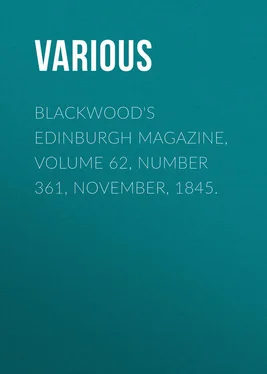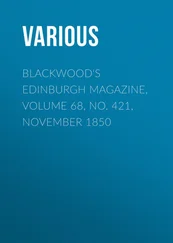Various - Blackwood's Edinburgh Magazine, Volume 62, Number 361, November, 1845.
Здесь есть возможность читать онлайн «Various - Blackwood's Edinburgh Magazine, Volume 62, Number 361, November, 1845.» — ознакомительный отрывок электронной книги совершенно бесплатно, а после прочтения отрывка купить полную версию. В некоторых случаях можно слушать аудио, скачать через торрент в формате fb2 и присутствует краткое содержание. Издательство: Иностранный паблик, Жанр: periodic, foreign_edu, Путешествия и география, на английском языке. Описание произведения, (предисловие) а так же отзывы посетителей доступны на портале библиотеки ЛибКат.
- Название:Blackwood's Edinburgh Magazine, Volume 62, Number 361, November, 1845.
- Автор:
- Издательство:Иностранный паблик
- Жанр:
- Год:неизвестен
- ISBN:нет данных
- Рейтинг книги:3 / 5. Голосов: 1
-
Избранное:Добавить в избранное
- Отзывы:
-
Ваша оценка:
- 60
- 1
- 2
- 3
- 4
- 5
Blackwood's Edinburgh Magazine, Volume 62, Number 361, November, 1845.: краткое содержание, описание и аннотация
Предлагаем к чтению аннотацию, описание, краткое содержание или предисловие (зависит от того, что написал сам автор книги «Blackwood's Edinburgh Magazine, Volume 62, Number 361, November, 1845.»). Если вы не нашли необходимую информацию о книге — напишите в комментариях, мы постараемся отыскать её.
Blackwood's Edinburgh Magazine, Volume 62, Number 361, November, 1845. — читать онлайн ознакомительный отрывок
Ниже представлен текст книги, разбитый по страницам. Система сохранения места последней прочитанной страницы, позволяет с удобством читать онлайн бесплатно книгу «Blackwood's Edinburgh Magazine, Volume 62, Number 361, November, 1845.», без необходимости каждый раз заново искать на чём Вы остановились. Поставьте закладку, и сможете в любой момент перейти на страницу, на которой закончили чтение.
Интервал:
Закладка:
The joy experienced by Don Manuel Herrera upon once more treading his native soil, did not so engross him as to prevent his observing the melancholy of his son. In reply to his father's enquiries, Luis informed him of his attachment to Rita, and of the interdict which the count had put upon its continuance. Don Manuel was indignant at what he termed the selfish and unfeeling conduct of Villabuena, who would thus sacrifice his daughter's happiness to his own pride and ambition. He then endeavoured to rouse the pride of Luis, and to convert his regrets into indignation; but, finding himself unsuccessful, he resolved to try the effect of change of scene and constant occupation. He set out with his son for Old Castile, of which he was a native, and undertook various journeys through the province in search of a small estate, such as his means would permit him to purchase, and upon which he might in future reside. This he at last found, a few leagues to the south of Burgos. The purchase completed, there were still many arrangements to make before Don Manuel could settle down and enjoy the peaceful country life which he had planned for himself, and in making these arrangements he took care to find his son abundant and varied employment. But all his well-meant efforts were in vain. Luis could not detach his thoughts from one all-engrossing subject; and at last, although Count Villabuena had expressly forbidden any correspondence between his daughter and young Herrera, the latter, after some weeks' absence, unable to resist any longer his desire to hear from Rita, ventured to write to her. The letter was intercepted by the count, and returned unopened, with a few haughty lines expressive of his indignation at the ingratitude of Luis, who was requiting the kindness he had received at his hands by endeavouring to thwart his plans and seduce the affections of his daughter. The terms in which this letter was couched roused the ire of Don Manuel, who in his turn forbade his son to expose himself to a repetition of similar insults by any communication with the count or his daughter. Shortly afterwards Luis returned to Salamanca to complete his studies.
The profession of the law, to which young Herrera was destined, had never had any charms for him. His own inclinations pointed to a military career, which he had on various occasions urged his father to allow him to adopt; but Don Manuel had invariably refused his request, alleging the poor prospect of advancement in time of peace, and in a service in which nearly all promotion was gained by interest and court-favour. Nevertheless, from his earliest youth Luis had devoted his leisure hours to the attainment of accomplishments qualifying him for the trade of war. He was the boldest horseman, most skilful swordsman, and best shot in the University of Salamanca. His superiority in these respects, his decided character, and agreeable manners, had gained him considerable popularity amongst his fellow-students, who frequently expressed their surprise, that one whose vocation was evidently military should abide by the dusty folios and dry intricacies of the law.
More insupportable than ever did his studies now appear to Luis, who nevertheless persevered in them for several months after his father's return to Spain, endeavouring by strenuous application to divert his thoughts from his hopeless attachment. Weary at length of the effort, he determined to abandon a pursuit so uncongenial to his tastes, and to seek a more active course of life, and one for which he felt he was better suited. His plan was to repair to Africa, and endeavour to obtain a commission in one of the foreign corps which the French were raising for their campaign against the Bedouins. Should he fail in this, he would serve as a volunteer, and trust to his courage and merits for procuring him advancement. Previously, however, to the execution of this scheme, he resolved to see Rita once more, ascertain from her own lips whether there was a chance of the count's relenting, and, should there be none, bid her a last farewell. He would then return to his father's house, and obtain Don Manuel's sanction to his project.
Since the unfortunate death of the young Villabuenas, Herrera's chief intimate at the University had been Mariano Torres, a hot-headed, warm-hearted Arragonese, entirely devoted to Luis, to whom he looked up as a model of perfection. To this young man Luis had confided his love for Rita, and her father's opposition, and to him he now communicated his new plans. To his infinite surprise, scarcely had he done so when Mariano, instead of expressing regret at his approaching departure, threw his three-cornered student's hat to the ceiling, tore off his gown, and declared his intention of accompanying his friend to Africa, or to any other part of the world to which he chose to betake himself. Luis tried to persuade him to abandon so mad a resolution; but Torres persisted in it, protesting that it would suit his taste much better to fight against Bedouins than to become a bachelor of arts, and that he had always intended to leave the University with his friend, and to accompany him wherever he might go. Trusting that, by the time they should reach Navarre, Mariano's enthusiasm would cool down, and his resolution change, Luis at length yielded, and the two friends left Salamanca together. Travelling by the public conveyances, they reached Valladolid, and subsequently the town of Soria, whence they had still nearly twenty leagues of high-road to Tudela. The path across the mountains being considerably shorter, and in order to diminish the risk of being seen by persons who might inform the count of his arrival, Luis resolved to complete the journey on foot; and after two short days' march, the young men reached the neighbourhood of Count Villabuena's residence.
The church and convent clocks of the right Catholic city of Tudela had not yet chimed out the hour of noon, when Luis, impatient for the interview promised by Rita, entered the count's domain by the same path as on the previous evening. Before he came in sight of the house, he was met at an angle of the shrubbery by Rita herself.
"I was sure you would take this path," said she, with a smile in which melancholy was mingled with the pleasure she felt at seeing her lover; "it was your favourite in days gone by. Our interview must be very brief. My father was to have remained at Tudela till evening, but something has occurred to derange his plans. He sat up the whole night in close conference with some gentlemen. At daybreak two couriers were dispatched, and the count rode away with his friends without having been in bed. He may return at any moment."
Luis drew the arm of his mistress through his own, and they slowly walked down one of the alleys of the garden. Rita had little to tell him favourable to the hopes which he still, in spite of himself, continued to cherish. The appeals which she had ventured to make to her father's affection, and to his regard for her happiness, had been met by severe reproof. Her evident depression and melancholy remained unnoticed, or at least unadverted to, by the count. All that she said only confirmed Luis in his resolution of seeking high distinction or an honourable death in a foreign service. He was deliberating, with eyes fixed upon the ground, on the best manner of breaking his intentions to Rita, when an exclamation of alarm from her lips caused him to look up, and he saw Villabuena crossing on horseback the end of the walk along which they were advancing. The count's head was turned towards them, and he had without doubt seen and recognised them.
Herrera's resolution was instantly taken. He would seek the count's presence, take upon himself the whole blame of his clandestine meeting with Rita, and appease her father's anger by informing him of his proposed self-banishment. Before, however, he had succeeded in calming Rita's fears, he again perceived the count, who had left his horse, and was advancing slowly towards them, with a grave, but not an angry countenance. On his near approach, Luis was about to address him; but by a wave of his hand Villabuena enjoined silence.
Читать дальшеИнтервал:
Закладка:
Похожие книги на «Blackwood's Edinburgh Magazine, Volume 62, Number 361, November, 1845.»
Представляем Вашему вниманию похожие книги на «Blackwood's Edinburgh Magazine, Volume 62, Number 361, November, 1845.» списком для выбора. Мы отобрали схожую по названию и смыслу литературу в надежде предоставить читателям больше вариантов отыскать новые, интересные, ещё непрочитанные произведения.
Обсуждение, отзывы о книге «Blackwood's Edinburgh Magazine, Volume 62, Number 361, November, 1845.» и просто собственные мнения читателей. Оставьте ваши комментарии, напишите, что Вы думаете о произведении, его смысле или главных героях. Укажите что конкретно понравилось, а что нет, и почему Вы так считаете.












